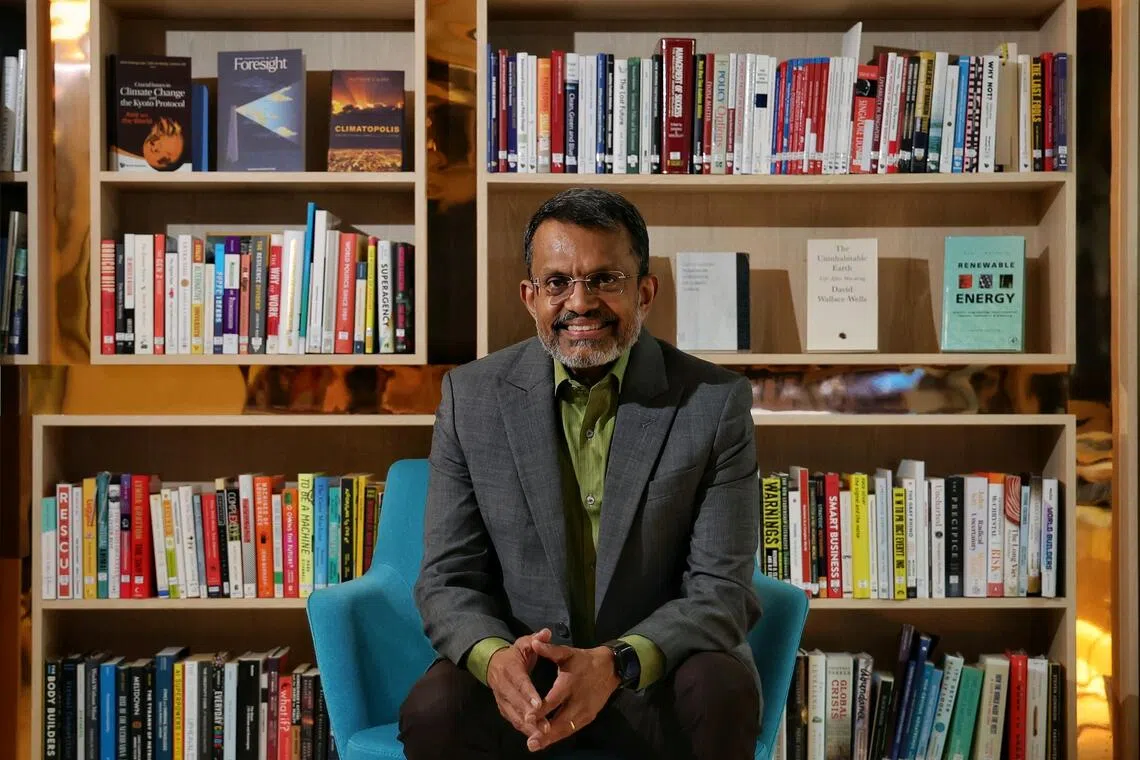With climate impacts escalating, adaptation has grown in importance: S’pore climate ambassador
Sign up now: Get ST's newsletters delivered to your inbox

Mr Ravi Menon said adaptation is a major priority for him in his role as Singapore’s Ambassador for Climate Action.
ST PHOTO: KEVIN LIM
SINGAPORE - The need to be prepared to deal with climate change impacts has grown in importance over the past year, said Singapore’s Ambassador for Climate Action Ravi Menon on Oct 21.
Speaking to the media in his first official interview since he was appointed in April 2024
“It’s also becoming clear that it is unlikely – or next to impossible – that the world can limit global temperature increase to within 1.5 deg C above pre-industrial levels,” he said. “So the logic flows that there will be serious climate impacts.”
Climate scientists have said that warming must be limited to 1.5 deg C above pre-industrial levels to avoid catastrophic climate impacts.
Given this, it is clear that Singapore needs to “double down” on adaptation efforts – as a country, and in collaboration with its neighbours, said Mr Menon during the interview held at The Treasury.
Adaptation is thus a major priority for him in his role as Singapore’s Ambassador for Climate Action, he said.
In the role – which is a first for Singapore – Mr Menon represents the country at international climate action platforms.
He also helps to drive partnerships with local stakeholders, in particular the business community, to help them contribute to global discussions on how to address climate challenges.
Climate adaptation is one of two key prongs of climate action, and refers to actions that reduce the impact of climate change on communities. This could include building sea walls to keep out sea-level rise.
How to measure progress on adaptation and ways of financing such initiatives are expected to be key topics of discussion at the upcoming UN climate change conference COP30, to be held in the Amazonian city of Belem in Brazil from Nov 10 to 21.
The other prong of climate action is mitigation, which mainly helps in bringing down the amount of planet-warming emissions. This includes, for instance, tapping cleaner energy sources.
“One of the things that I have personally learnt over the last one year is that we can’t look at our risks in isolation within territorial Singapore; we have to look at our risks in a regional, and sometimes global, context,” said Mr Menon, who was previously the chief of Singapore’s central bank.
Climate risks can also have spillover effects, he said, and this is also known as transboundary climate risks.
For example, the Mekong River is the longest river in South-east Asia that winds through China, Myanmar, Thailand, Cambodia, Laos and Vietnam.
It feeds the Mekong Delta – which is a major contributor to rice production in the region, he said. But more frequent extreme weather events driven by climate change, such as drought and floods, pose risks to rice production across the Mekong basin.
“These areas need much further study to see how we can work together to change some agricultural practices, and what other reforms might be needed… There is a lot of work that local governments need to do,” he said.
Citing international collaboration as another “big part of his work”, Mr Menon said that little is understood about such risks, but that he is keen to understand them better.
“It’s a whole gamut of issues that we need to come to better grips on, prioritise them, because you can’t do everything at the same time. But most important is collaboration and cooperation. No single country can manage this on its own, so Asean countries need to work closer together on this,” he said.
Singapore can contribute to this effort by marshalling finance for climate action, and working with partners on technological solutions and policy frameworks, he added.
Currently, climate initiatives are usually funded by governments, but it is becoming increasingly clear that this source of funds alone will not be enough.
“For the longest time, most of the finance was from public sources, and there is simply not enough public financing in the world to meet the financing gap for climate mitigation. Most governments have high levels of public debt,” he said.
The private sector can help to narrow this gap, Mr Menon said, pointing to financial instruments being developed in Singapore that could increase the involvement of the private sector.
He cited the example of Singapore’s national blended finance initiative, dubbed Financing Asia’s Transition Partnership (Fast-P).
Blended finance usually starts with capital from public or philanthropic sources as a catalyst to spur the private sector – which holds most of the world’s wealth – to invest in sustainable development.
Such projects could be beneficial for nature or the climate, but the high perceived risks of starting these projects
Blended finance initiatives that involve concessional capital with higher risk tolerance or even the willingness to accept losses, such as philanthropic funds, could lower the barrier to entry for investors to get involved in such projects.
Fast-P was launched in 2023 to bring together public, private and philanthropic capital to help finance Asia’s green transition, with the aim of eventually raising up to US$5 billion (S$6.5 billion) from these sources.
Of the three funds that make up Fast-P, one of them has already secured US$510 million
Asked if it would be challenging to implement blended financing schemes for climate projects that may not generate revenue, such as building sea walls, Mr Menon said: “Maybe we should challenge that assumption.”
He said that while the sea wall itself does not generate a revenue stream, it protects private assets along the coastline. “(Asset owners) are gaining from this, and should they not bear part of the cost, even if there’s no direct revenue being generated?”
Mr Menon urged the private sector to design adaptation projects which generate revenue.
“If agricultural yields are dropping, say, in a rice farm, and you bring in financing to change irrigation methods to raise productivity or seeds resilient to climate change, rice yields go up and revenues are higher,” he said. “So there’s a revenue stream that you can tap.”
He also cited transition credits
These credits are a new class of carbon credits. When a coal plant is closed early, some planet-warming emissions are prevented from being released. These “savings” can be sold as carbon credits to emitters.
Responding to a question on why financing is needed to close a coal plant early, instead of using the capital to build more renewable energy plants in the region, Mr Menon said: “We need to phase out coal… which is the dirtiest of the fossil fuels.”
Asia’s rapid development and hunger for energy is fuelling investments into new renewable energy plants, which will meet upcoming demand for energy, he pointed out.
However, existing needs are still largely met by fossil-fuel plants. “If you don’t shut them down, they’re going to be doing this for the next 30, 40 years, and you’re going to have rapid global warming and catastrophic climate change,” he added.
Mr Menon said that while political commitments on climate change globally are slackening, those involved in sustainability “continue to show great commitment”.
“In the next 10 to 20 years, climate change will be one of the major preoccupations of governments, of businesses and of the general public,” he said. “It’s better to start preparing early than to be caught up in a rushed, disorderly transition which will be forced upon us.”
Those who continue to work on the transition early will be in a better position
“Singapore has made that calculation, and that’s why we are so totally committed to climate action, and continuing to do so many things despite all the distractions that we have elsewhere.”



